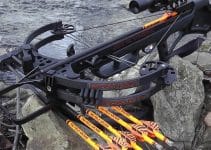That bulky 350 lb draw weight, 330 FPS crossbow you just bought is fantastic, but if you’re putting low-grade crummy bolts in it, then you’re doing a disservice.
You’re not using the full potential of that new bow without low-weight, high-powered bolts to accompany it.








These are the best crossbow bolts out there, from some of the finest manufacturers in the crossbow hunting community. You’ll find top-tier quality here, along with some of the best features that your current bolts probably don’t have.
We’ve rounded up the five best bolts out there with the widest versatility, best shaft material, and paid attention to budget, grain weight, and everything in between. It’s time to upgrade your bowhunting game.
Best Crossbow Bolts – Reviews For 2021
Best Crossbow Bolts For Hunting: BloodSport 20” Crossbow Bolts
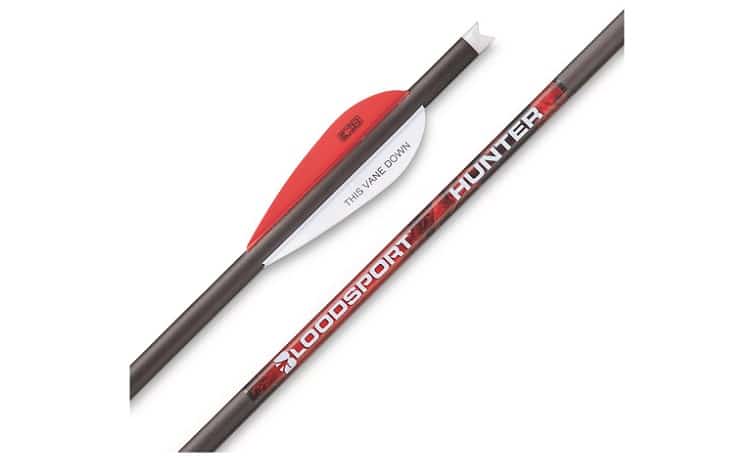
- Material: Aluminum
- Size: 20” length
- Weight: 325 grain per finished bolt
BloodSport simply has the best crossbow bolts. Plenty of brands can come out with similar shaft materials and construction, but they won’t feel the same as others. There’s just something about the way that BloodSport constructs these that makes them feel fantastic when you load them up.
Measured in a .003 straightness, you won’t get a clearer shot in this price range. In a six-pack of bolts at a reasonable price, you get quality half moon nocks that line up without any issues. The only complaint here is that the feather material isn’t as intuitive as it could be. There’s just not quite enough of it.
But thanks to the red feather tip, you’ll be able to spot this in the woods when you take down prey, or if you miss and it ends up going into a tree limb in the background. The sweet spot for most crossbow bolts is somewhere between 300 grains and 350, and BloodSport hit the nail on the head at a perfect 325 grains.
Between weight, cost, and the feel of using these bolts, BloodSport topped our list with a few caveats here and there. Available in six-packs and 36 count containers, these bolts are designed to last for decades to come with proper care.
Runner Up: Nika Archery 22” Moon Nock Crossbow Bolts
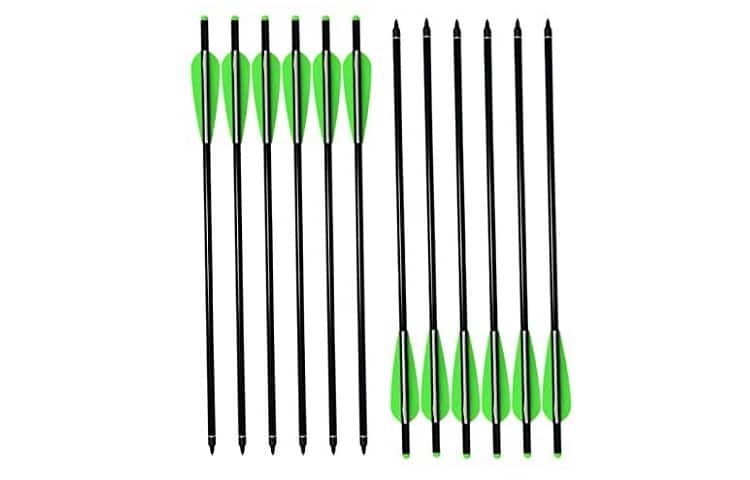
- Material: Aluminum
- Size: 22” length
- Weight: 125 grain per head (total not specified)
They not only offer 20 inch crossbow bolts, but 16 inch, 18 inch, and 22 inch (which are the ones we’re reviewing now). Nika Archery fits just about every crossbow out there, minus speciality ones that only use longer shafts.
Made of high-end aluminum, Nika Archery’s bolts feel nice and lightweight in your hands, but you’d be surprised to find that they actually end up weighing more than most bolts. The sweet spot is generally thought to be in between 300 and 350 grains, but regardless of which length you choose, you might have a hard time fitting the mold. The heads alone weigh 125 grains (more than the standard 100 grains), and Nika Archery doesn’t give specifics on the shafts.
From what we can assess, these end up weighing about 400 grains for 20” bolts, and over 430 grains for 22” bolts, although this is an assessment after weighing them against other similar bolts in grams, not grains. While those numbers may not be pinpoint accurate, these bolts do weigh more than most. For 22” in 80+ lb draw weights, that can be a good thing.
In terms of versatility, these will fit just about every crossbow out there. The shorter bolts may work for pistol crossbows depending on which one you get, and also work up to 220 lb draw weights on high-powered bows. If you do have a crossbow with that much power, Nika Archery can handle every shot.
You get a dozen in a pack, although there are other options available. Nika Archery provides one of the best bangs for your buck. With good feathers, solid tips, and a decent nock, you’ll do well in every hunt going forward with Nika Archery on your side. We can’t say that these will last for thirty to forty years, but they should get the job done for the next decade or so.
Alternative: CQ Archery Crossbow Bolts with TPU Vanes
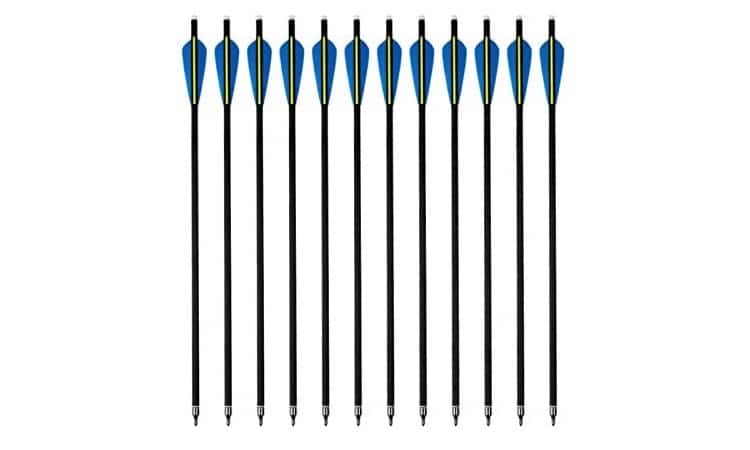
- Material: Carbon metal mix
- Size: 16”, 18”, 20” length
- Weight: 368 grain, 380 grain, 425 grain
20 crossbow bolts tend to come with high durabilities and draw weight limits, and that’s exactly what CQ archery has brought to the table here. You have three lengths available, but for the sake of seeing what they were capable of, we went with the 20” crossbow bolts.
Higher draw weight specs mean higher grain weights. CQ Archery gives you 425 grains per crossbow bolt, which is pretty hefty, but because they’re expected to be used with higher draw weight bows (usually over 80 lbs at the very least), this is perfectly within range. Most crossbow hunters just don’t go too high for draw weight here, but that gives you the option to choose their 16” 368 grain bolts instead if that tickles your fancy.
The vanes, or feathers, are made out of TPU for durability and long-term use. While you might run into some issues in terms of quality, they hold up for long enough and can be switched out at a later date. You can put these bolts through some serious pain, and for that reason CQ Archery has made it easy to switch out vanes and heads as needed.
With care, these carbon metal mix bolts should last you for twenty to forty years depending on how much you use them. Heads should be replaced as you see fit. If there’s any takeaway here, it’s that while CQ Archery may not make the best bolt heads, they are exceptional at making arrow shafts, so after you put them through the ringer you’ll be able to buy some third-party heads to mix here and toy with the grain weights.
Best Carbon Crossbow Bolts: Elong 12×16 Carbon Hunting Bolts
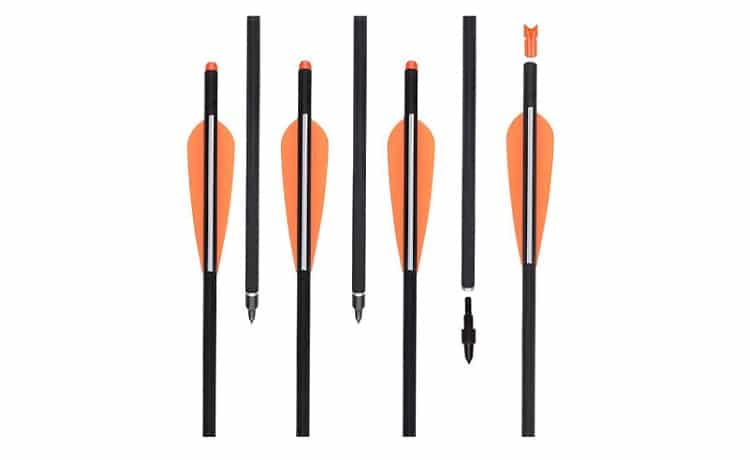
- Material: Carbon metal mix
- Size: 16”, 18”, 20”, 22” length
- Weight: 125 grain tips, no specifications on shaft weight
When you think of the best bolts for crossbow use, what comes to mind? Elong had a vision of being budget-friendly, and while they’ve definitely pulled that off, there’s also a trade-off here.
You get fairly low quality plastic nocks, and I just wanted to get that out of the way now. These will need to be replaced, because since these bolts can go up to 220 lb draw weights, that level of tension can make short work of these nocks.
Did Elong succeed in making budget-friendly crossbow bolts that work? They sure did. You get these in a pack of six for about 20-25% less than what you can expect from other brands in the same space.
Good budget pick, but you will need to replace the nocks in the future. Thankfully, this is a very low-cost repair so it doesn’t really take away from the value. With carbon metal mix shafts and solid TPU vanes, these work out to be a great deal from a trusted brand. Save for the obvious, these should last for twenty to thirty years with TLC, and will serve you well during the hunt.
Best Aluminium Crossbow Bolts: Szeo Carbon Aluminum Crossbow Bolts
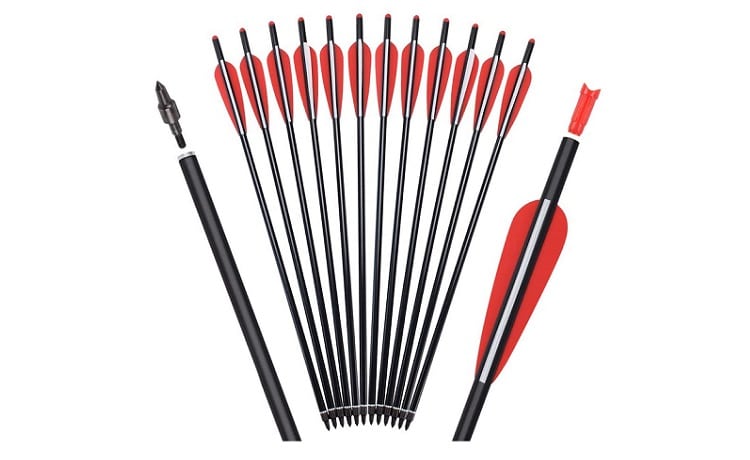
- Material: Carbon and aluminum mix
- Size: 16”, 18”, 20”, 22”
- Weight: 440 grain per finished bolt (22”)
Last but not least, we have one of the best crossbow bolts for the money: Szeo’s twelve pack of quality bolts with a maximum draw weight of 220 lbs. Generally in this space, you get less for higher durability, but Szeo holds up to the challenge.
You’ll see similar nock quality to Elong’s 12×16 bolts. They’re not designed to last forever, but they’ll do for about five years or so before you have to switch them out. The TPU vanes hold up well enough, just try not to leave them out in the sun if you can avoid it.
At 22”, these have a slightly high weight of 440 grains, but considering the crossbow gauge that you’ll be using in this space, it’s justified. You may notice faster drops after twenty yards, but under one hundred yards, your aim should be relatively the same.
These have a nearly 1.2mm diameter, which is thick enough to be durable with 120 lb draw weights and under, but just because it can go up to 220 doesn’t mean that it should. These are budget picks for a reason. You can expect these to last about ten or fifteen years before cracks in the shafts become noticeable or cause issues, but that’s a low cost-to-entry for over a decade of hunting and recreational shooting.
Crossbow Bolt Buying Guide and FAQ
Why is a Crossbow Arrow Called a Bolt?
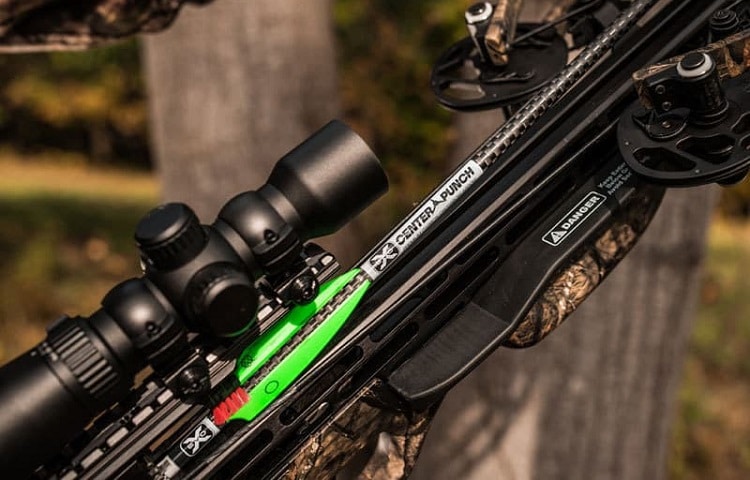
I can tell you this much: it wasn’t named after a bolt of lightning, which is something that people often assume. It actually comes from the original production of large-scale medieval crossbows, which were largely believed to originate from the French,
They called these enormous arrows bolts because they resembled big bolts used in machinery and construction at the time. The nock of each bolt was broad and usually square, so it was just easier to call them bolts rather than “really big arrows”.
While the best 20 inch crossbow bolts or high-performance marksman bolts don’t resemble those of the past, they keep the name to differentiate their use from arrows so bowhunters don’t grab the wrong ammunition.
What is the Difference Between Crossbow Bolts and Arrows?
Best crossbow bolts for hunting are not the same as the best arrows for hunting: they respond differently regardless of the draw weight and other similarities between crossbows, recurves, and compounds. These are the main differences between bolts and arrows, and why they aren’t interchangeable with one another.
- Length: Bolts are shorter than arrows. Most crossbow bolts range from about 16” up to 22”, and rarely any longer than that. Whereas arrows tend to start at 24” just for youth, but 27” to 32” for adult archers. There’s a pretty big difference. Crossbows require a shorter length by design; you want clearance from the tip of the bolt to the nock without it being difficult to hold. Bows require full shoulder and arm extension, and because there’s no mechanical power to it, the further back you nock the arrow, the stronger your shot will be.
- Grain Weight: With bolts, you tend to get a straightforward answer on how many grains one single bolt weighs. With arrows, you have a GPI, or grains per inch. This adds shaft material, head weight, and feather weight together. A 31.5” arrow with a 9.5 GPI weighs 299.25 grains. It’s a slightly more complex way of doing it, but no matter how you arrive at the sum, recurve and compound arrows end up being about 15% lighter than crossbow bolts on average, even with the extended length.
- Heads: Arrow heads and bolt heads are relatively similar. You can have both field tip and broadhead arrows and bolts, the only difference may come down to minor dimensions due to the shaft screw-in width (aluminum and carbon shafts). Heads for wooden arrows will be different. The performance is basically the same, it’s just installation and a few centimeters here and there that will differ.
- Shaft Material: Arrows can be made from wood, composite, carbon, steel, aluminum—the world’s your oyster. While plenty of bow archers use carbon shafts, that’s a choice they get. Crossbow bolts can be made out of wood, but you’d be foolish to use them. Because of the immense pressure that crossbows force on the bolt while it’s cocked, a wooden shaft would become warped almost immediately. You have less shaft options with crossbow bolts, but it’s not really an issue because you have the best materials to choose from.
Can a Crossbow Bolt Penetrate a Skull?
A 350 grain, broadhead bolt, driven from an 80 lb crossbow can absolutely penetrate a skull (animal or human). The sheer kinetic energy that a crossbow produces is not only astounding, but exceptionally dangerous.
The best crossbow bolts and broadheads with an aerodynamic design, coupled with a top-notch crossbow can cause serious damage. There’s a reason that in most instances, a single shot can take down a 1,500 pound moose or a 1,200 pound bear: this stuff is powerful.
Keep in mind that it’s been proven that a 45 pound recurve bow could also penetrate bone, so you’re dealing with an egregious amount of power. Use it wisely.
How Far Will a Crossbow Bolt Travel?
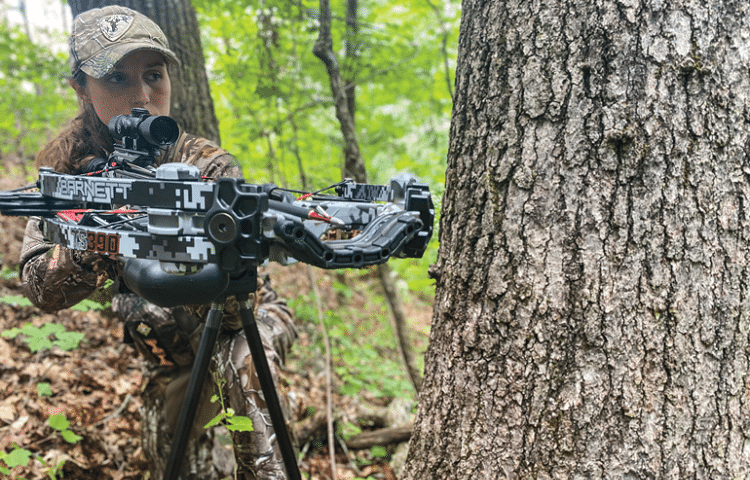
The best carbon crossbow bolts with zero bend, near-perfect straightness, and those that are propelled from an insane 175 lb draw weight crossbow can travel far. Around 500-700 yards, or 1,500 to 2,100 feet.
But just because it can travel far doesn’t mean that it will travel accurately. On average, a simple 350 grain crossbow bolt will already drop by 20+ inches from a 50 yard travel distance alone. If you get the angles right and there’s no wind, you might even be able to make a crossbow bolt travel a half-mile. Every single condition would have to be nearly ideal, from the bow to the weather, but it could work.
Distance and accuracy are rivals. The further a bolt travels, the less accurate it will become. This has to do with trajectory, wind speed and direction, the bolt grain weight, and all the ways that these variables interact with your shot.
Does Crossbow Bolt Length Matter?
The length absolutely matters. There’s a good reason that you only really see bolts from 16” up to 22”, and that has to do with weight.
Bolts use head, shaft, and assembled grain weight. The head weight plus the shaft weight equals the assembled weight. This matters because you can switch out bolt heads and put them onto different shafts if you want to customize your crossbow bolts.
Every grain has an impact on your shooting performance in one way or another. The length of the bolt matters because the longer the shaft, the more material and grain weight are used. When a bolt is long but not thick enough, it can bend or break from the tension of the draw weight.
A bolt has to be short enough to fit in a crossbow, long enough to have great aerodynamics, and weigh somewhere in between being heavy enough to cause damage, but light enough to not receive major drag during its flight path. In short: bolt manufacturers must have one hell of a time trying to get these things right.
The best crossbow bolts for deer hunting, for example, need to have a healthy balance of weight to actually drive a deadly shot, and length to penetrate deer hide while still being retrievable. Bolt length doesn’t matter nearly as much for leisurely shooting.
Are Crossbows More Accurate Than Bows?
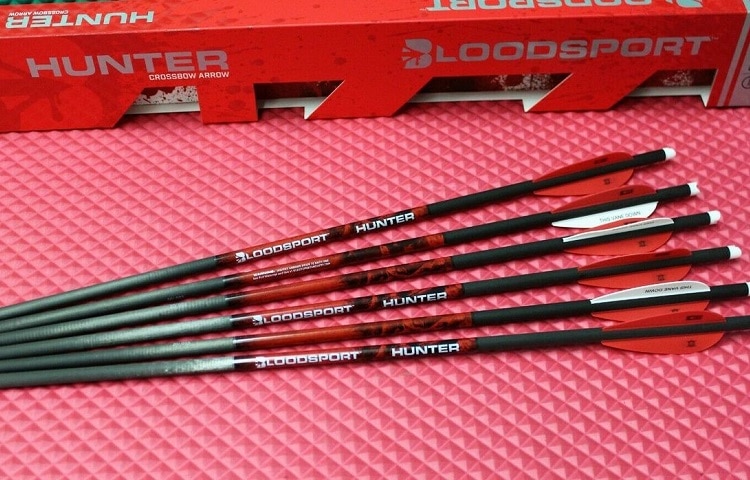
Despite the variables of pull strength and draw weight being completely manual, vertical bows (standard bows) are more accurate than crossbows. However, it all depends on the skill of the user.
Crossbows don’t have a higher skill ceiling, but they do have more potential problems than vertical bows do. Crossbows are heavy and more difficult to aim, whereas vertical bows are generally lightweight. The most popular recurve bow on the market—the Samick Sage—is just 3.5 pounds in total, and compared to crossbows, that feels light as a feather.
Just because you can be more accurate with a recurve or compound bow doesn’t mean that you can’t be deadly accurate with a crossbow. Recurve bows tend to be extremely accurate even from 77 yards away (the Olympic standard), but most of the time, you won’t be that far with a crossbow during hunting.
Can You Reuse Crossbow Bolts?
Yes, you can absolutely reuse crossbow bolts. If you do some quick price research, you’ll see that bolts are generally pretty expensive when you break down the cost. The way that it’s justified is in its durability and nearly lifetime use.
Crossbow bolts are meant to be bought once, and used from that point onward until they’re absolutely destroyed. It’s the reason that manufacturers use aircraft-grade aluminum in the shafts on most of these bolts; it lasts forever, and that’s what crossbow users expect.
To know if your bolts are reusable, ask yourself the following:
- Is my bolt cracked? Take a look at your bolt from the nock to the tip. Use a flashlight to identify cracks. If you have a workbench with a bright light, inspect it there. Cracks in the shaft are not only difficult to remedy, but they can completely ruin the flight path of your bolt. Depending on the machinery you have available, you may be able to patch it and machine it, but you may alter the straightness rating of your bolt.
- Is my bolt dented? This directly affects the flight path and straightness of the bolt. It doesn’t seem like all too big a deal, but once you fire it, you’ll notice that it doesn’t land on the mark. The deeper the dent, the worse your shot will be. This can be frustrating when you’ve sighted yoru brand new scope and know that everything else is working as planned.
- Is my bolt warped in any way? Warping is something that just happens after tons of shots. It’s possible to re-straighten your bolts in your home workshop, so this doesn’t have to be a death sentence for your crossbow bolt. If you notice, manufacturers list the straightness of their bolts for a reason: the straighter the bolt, the more accurate the shot.
Crossbow Hunting the Right Way
That powerful crossbow that you have is about to feel a whole lot more powerful with these hard-hitting, razor sharp crossbow bolts made out of the finest materials.
This guide just goes to show you that you don’t have to hemorrhage your entire hunting budget to get quality, long-lasting crossbow bolts. Treat these well, and they may be the last ones that you’ll ever need.
